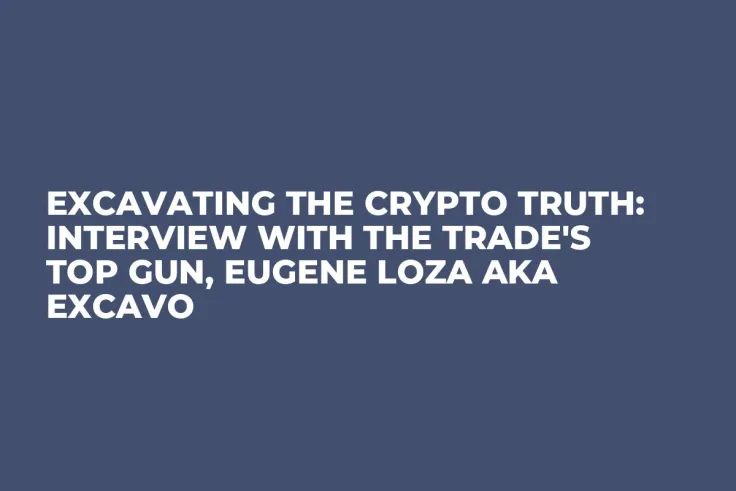In the times of uncertainty in the fintech sector, U.Today sat down with Eugene Loza, known by many colleagues and followers as EXCAVO, to have a thorough chat. Being one of the most sought-after experts in the field of crypto trading, we wanted to get the man’s perspective on today’s situation and attempt to excavate some of the deeper buried layers of the crypto truth.
On Becoming a Trader
U.Today: You are the top trader on TradingView and a big expert in the field. Can you please give us your backstory? How did you find yourself trading cryptocurrencies?
EXCAVO: It all started when I got to attend one of Bill Hubbard’s lectures, which made me very interested. After that, I started working at a brokerage firm where I was able to formulate more questions, and my desire to learn how the whole industry works multiplied. I left the company two years later and―having promised myself to spend at least half my life learning the market inside out―entered the Kiev Institute of International Relations.
By then, I already knew quite a bit and started to publish graphs on gold and oil trade, as well as on some American and European indices. At one point, when I was working as a portfolio manager for one Canadian client, he paid my commision using Bitcoin. This is how I first got acquainted with the world of cryptocurrencies and subsequently started to delve into it, which led to where I am right now: running my own analytics company and crypto academy.

U.Today: What should one keep in mind in order to stay sane and not lose one’s earnings in the process? Basically, what are the do’s and the don’ts of cryptocurrency trading?
EXCAVO:
You have to be disciplined and self-organized. Sticking to your own trading plan no matter what is an absolute must. The worst thing one can do is start jumping on a bandwagon following market trends. You need to always stay cool-headed and think twice before acting.
U.Today: What is your advice for anyone wishing to enter the market in the capacity of a crypto trader?
EXCAVO: The most important thing is how you treat the whole process: you must be serious and diligent. And, of course, experience is vital. You need to spend at least 10 000 hours learning the trade before starting to approach an expert like level.
There is such a thing as the “pickle effect”, as it is known where I come from. Everyone is born a fresh cucumber, so to speak, but if a cucumber is put into a jar with pickles and left marinating there, sooner or later, that cucumber will, too, become a pickle. Like the others in the jar. The question is how good of a pickle you are going to be. Find a decent fund or a trading company, roll up your sleeves, and soak in as much juice as you can.
Interpretations of Price and Market Cap Values
U.Today: We have recently covered a research study published by computer scientists from University College London who concluded that Reddit markers could be used to predict cryptocurrency rates. As someone whose very job is to predict crypto movements, can you share your thoughts on this?
EXCAVO: First of all, the market is comprised of people with different emotions and goals, and certainly each one with their own strategy. The crucial thing here is not to let the ground slide from under your feet in the times of hype.
In terms of Reddit, it can definitely be used to predict crypto rates. To my mind, the obvious reason is that shared information is prone to influencing one’s decision making. When large chunks of data are thrown at those involved in the crypto trade, it is bound to affect what is happening in the market.
Consequently, not only can Reddit be used to predict prices, but it can be used to actually change prices. And this is indeed what some individuals do in order that their agendas be pushed forward.
Normally, calendars are used to structure such targeted news―in case of Reddit, the so called sub-reddits―which come out at certain times to meet certain outcomes, including changes in rates, quite similar to, say, how my graphs may influence the others on TradingView.
U.Today: A seemingly trivial question, yet the one many do ask. Why is there often such a big divide between market cap and price values of cryptocurrencies? Some coins occupy virtually the same positions market cap- and unit price- wise, e.g. Bitcoin, Ethereum, Dash, etc. But this isn’t the case with all altcoins. For instance, Maker is currently second only to Bitcoin in terms if its unit value, but it’s not even in the top twenty by market cap. In contrast, some companies like Ripple or IOTA are among global leaders by market cap, yet the coins are valued at around 50 US cents a pop. Why so?
EXCAVO: Well, first of all, we need to understand that most of these statistics are very subjective. Arguably one of the most popular sources is CoinMarketCap, and it is a very one-sided source.
Huge sums of money that flow outside the “official” market, for example Bitcoin to local fiat exchanges on LocalBitcoins, which are often humongous amounts, are not even taken into consideration by CoinMarketCap, since these transactions are not performed by professional traders. So, official stats may not be a good indicator of how things really are.
In terms of why there is such a big divide, well, we are dealing with different parameters. Market cap figures essentially show how much has been invested into a particular currency, how much trust is in it. Price, on the other hand, reflects a) how many coins of a particular brand there are on the market, and b) how it relates to that coin’s market cap representation.
In other words, Bitcoin and Ethereum have high market cap values and high prices because much has been invested into them, and there are not too many of these coins around, comparatively speaking. With Maker, there are also not many coins around, but simultaneously not that much has been invested, hence the high price but the low market cap. With Ripple, it’s the other way around: a lot has been put into the coin by investors, hence its very high market cap figure, but at the same time there are very many coins around (100 billion in total), so the price is not high, nor was it ever planned to be.
Adoption and Latest Developments
U.Today: Are cryptocurrencies going to be widely traded for anything other than fiat currencies any time soon, e.g. gold, oil, bonds, etc? Also, when will mainstream adoption be seen outside the trading circles, as far as readily available crypto payment systems go in public places like hotels, restaurants, shopping centres, etc?
EXCAVO: In terms of trading, yes, it is possible, of course. But the real question is whether the people who are trading gold and oil need it right now. First of all, it’s not even gold, let’s not forget, it’s gold futures, i.e. future prices of gold, that’s how much confidence and capital these folks have. And they are not likely to move away from what they are comfortable with and leap into something unfamiliar and volatile unless they see that there is more opportunity for them in cryptocurrencies. When they see it for a fact, they will surely move in for the kill.
As for oil, it’s a different story altogether. These business sharks―namely Goldman Sachs, JP Morgan, and City Bank―also trade futures, and they are all working under the Federal Reserve system. And, of course, oil trade is based on the USD and USD alone, by its very definition, thanks to Henry Kissinger. So this is a political issue.
The US government simply won't allow any other, non-USD type, exchanges unless these exchanges begin to serve the government’s own interests. So, yes, crypto traders are ready to incorporate other commodities, be it metals or oil, into their exchanges, but it’s mainly the other side that has to reciprocate at this point. Sooner or later, it will probably happen, but not just yet.
As for adoption of crypto payments all across the board, this will absolutely happen, and it is happening already as we speak, as more places are offering crypto payment options in Europe and Asia. Similar to how we all use credit cards and mobile banking, crypto wallets are being incorporated into our lives as well. It is as easy and convenient as traditional banking, but it’s also much safer. In the centralized banking sector, you are likely one day to be told that you cannot withdraw your funds, for one reason or another, as it happened in Greece during their last big financial crisis when you could not take out more that 300 USD of your own money in one go.
With decentralized banking and crypto options, no one can ever tell you how much you can or cannot withdraw, or indeed what you do with your money and how you do it. This is crypto’s main advantage by far.
U.Today: Can you single out any strong newcomers to the market, be it cryptocurrencies or platforms? Anyone or anything to watch out for?
EXCAVO: I am reluctant to name any particular players, as I am not here to advertise, but I can tell you that security tokens will go a long away. With most altcoins, there is no auditing and hence no dependability, while most big players, understandably, do not want to roll the dice and invest into a black hole.
With a security token, there is much more stability, and it is much more stringently regulated. It is essentially a more secure version of your regular altcoin. As a result, the business is a lot more transparent, and your chances of being swindled are minimized greatly. One platform that specializes in security tokens that I can single out is Polymath, but that’s as far as I am willing to go with dropping names and brands.
To this I can add that information waves are always at play. Right now not too many people know about these security tokens, but as soon as enough people learn about their existence, there will be a rush, surely.
U.Today: You have recently attended the Blockchain Life Forum in St Petersburg, Russia. Were there any memorable moments for you during the event, any highlights?
EXCAVO: Generally speaking, I was very pleased to attend the forum and speak there. I must note that the standard was very high, both the official part and the unofficial after party. There were many decent speakers and experts. One panel I was on voiced an array of different opinions and methods, all with a very high level of professionalism.
Networking was ever present at the forum, which was great, of course. I, for one, even ran into one of my subscribers from TradingView―a fellow Brazilian trader from a Swiss fund―entirely by accident. This just shows how international both the forum and the crypto community at large have grown.
Insights into the Ongoing Bitcoin Crisis
U.Today: What are your predictions as we’re starting to slowly approach the New Year? We are currently going through a crypto crisis with Bitcoin’s price way down. What’s going to happen next?
EXCAVO: I was actually expecting the crisis, to tell you the truth, so to me this didn’t come as a shock. The technical analysis I do and other market pointers were good indicators that this was coming. The cycle was nearing its end.
Make no mistake, this crisis was man-made, like any other one. Certain individuals and companies with vested interests wanted the price of Bitcoin to plummet. When the price is down, you buy cheap and later sell for more when the price climbs back up, which it will at some point. For a big player all that matters is the long term, three to five years, sometimes even ten. As Rockefeller once said: “The way to make money is to buy when blood is running in the streets”.
As for other cryptocurrencies, before the end of this year other, somewhat smaller players will emerge victorious, and mini bubbles will probably pop up. Those that have proven themselves on the market already, especially the ones with their own blockchains, are more likely to succeed, followed by the previously mentioned security tokens a little ways down the road.
Ripple will grow, surely. So will Japanese NEM. Ethereum is currently down but for reasons very different from Bitcoin’s collapse: they are restructuring and cutting out the unneeded players on its massive platform. Once it’s done, the company will recover briskly.
Bitcoin Cash is in a state of utter mess: this second fork has made the company lose all its claim to the “real Bitcoin” ambition it had previously laid out. It’s still unclear what’s going to happen next, as it is not a financial issue anymore. One thing is clear to me though: Roger Ver must be kicking himself right now.
The Future of Blockchain and DLT
U.Today: What is the future of Blockchain in general? Whereas initially Blockchain was realized in terms of finance mostly, first Bitcoin and then other altcoins, now the tendency has partially shifted toward decentralized social networking sites? What do you think the future will bring?
EXCAVO: Blockchain and DLT will appear in many parts of our lives, from politics to medicine. Imagine, I have to go to a hospital in another country, for argument’s sake. There, they have no idea who I am, what my medical history is, my state of health as a child, etc. All that information is somewhere on the other side of the world, and in another language, with no access to it, let alone instant access. With the Blockchain technology today, this problem is no more. My medical history, universally available, can be accessed and made use of as easily as ordering a cab on your phone.
Of course, the other side of it is privacy, which we will see less and less of. Ironically enough, Blockchain’s decentralized nature from the technical standpoint is more centralized than anything else from the social standpoint, as everything about you is floating there in public space. But that’s the price we have to pay for progress, and it’s pretty much inevitable.
You get an iPhone, let’s say. It’s flashy and new, and you can unlock your screen with a finger tip. Great. But folks at Apple now have your fingerprint along with all your other personal information. We surrender our privacy for the sake of convenience. There are no two ways about it. So, where we ultimately end up is up to whoever is at the steering wheel, be it policy makers or company directors.
On the plus side, once again, it is making and will continue to make our lives easier. Companies like Mars, which are Blockchain’s patent bureaus, are gaining in strength, so the whole game is becoming better organized, more comprehensible to a non-geek, clearer and fairer.
In terms of decentralized social networks, yes, they may be on the rise. Any business works via crests (highs) and troughs (lows). If there is a trough with centralized networks, it can lead to a crest with decentralized ones. Binance, for instance, has come a long way, because at the time it had no real competitors as such. Everyone else was in a downward spiral, so people came to Binance to find a feasible alternative. Likewise, if users find themselves dissatisfied with, say, Facebook, and there is another, decentralized option on the table, they will surely give it a try, and if the new platform lives up to their expectations, they will stick to it, naturally.
All in all, financially, socially, and politically, we are at a crossroads, and more signs point to the fact that, one way or the other, we are going to take the Blockchain/DLT route, or at the very least we aren’t going to drive in the opposite direction, nor head for an early exit.




 Dan Burgin
Dan Burgin Vladislav Sopov
Vladislav Sopov